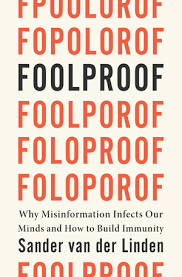
In Foolproof, Sander van der Linden lays out how misinformation works and what we can all do to counter the rising wave of fake news, conspiracy theories and all forms of misinformation. This is the most comprehensive book so far on this topic, which has consumed much of the author’s career and has become a particular problem in recent years especially during the pandemic, although many other authors have contributed to the field (see the references below).
The book lays out frameworks for thinking about these issues, such as CONSPIRE which summarises seven traits of conspiratorial theories:
- Contradictory
- Overriding suspicion
- Nefarious content
- Something must be wrong
- Persecuted victim
- Immunity to evidence
- Re-interpreting randomness
One of the problems of misinformation is the way that our brains react to repeated messages. The ‘mere exposure effect’ shows that the more we are exposed to a specific message, the more familiar and believable it becomes. The negative version of this effect is called the ‘illusory truth effect’ – even lies become more believable the more they are repeated!
He lays out some the antidotes to misinformation, including de-bunking and pre-bunking or “vaccinating” against misinformation. One of the better known techniques for debunking is the truth sandwich, first developed by George Lakoff, which lays out the facts before exposing the myth itself and the way it works in the following format:
- Start with the truth. The first frame gets the advantage.
- Indicate the lie. Avoid amplifying the specific language if possible.
- Return to the truth. Always repeat truths more than lies.
In van der Linden’s expanded version, the truth sandwich works like this (try it!):
FACTS Lead with the facts (make them simple and sticky using expert sources)
WARN Warn your audience about the myth (just once)
EXPOSE Expose the manipulation technique and explain how and why the myth is misleading
FACTS End by reinforcing the facts along with a credible alternative explanation
The book argues that there are six degrees of psychological manipulation:
- Discrediting (ie ‘fake news’)
- Emotion (especially negative)
- Polarisation (driving people apart)
- Impersonation (inclk. ‘shallowfakes’)
- Conspiracy (37% of Americans believe that a single secret group of people control world events)
- Trolling (using bait)
Because these are so common, whereas the details of any specific piece of misinformation are very specific, van der Linden writes that prebunking is better than debunking (i.e., prevention is better than cure). He writes:
“by injecting people with a severely weakened dose of fake news (the virus) and refuting it in advance, over time people can develop mental antibodies – psychological immunity -against misinformation”.
Or as Christopher Wylie put it more bluntly in Mindf*ck:
“In psychological warfare, the weak points are flaws in how people think. If you’re trying to hack a person’s mind, you need to identify cognitive biases and then exploit them.”
Van de Linden’s summary of all his work identifies 11 ‘antigens’ to misinformation:
- Make the truth fluent
- Incentivise accuracy
- Learn the tell-tale signs of conspiracy theories (CONSPIRE)
- Minimise the continues influence of misinformation
- Break the virality of misinformation on social media
- Avoid echo chambers and filter bubbles
- Be aware of micro-targeting
- Inoculate against misinformation
- Identify and prebunk the Six Degress of Manipulation (DEPICT)
- Help spread inoculation against misinformation
- Inoculate your friends and family
This book is a great read and an important summary of what is known about misinformation. Worth reading for everyone to be better prepared to deal with those who would seek to misinform.
REFERENCES
Douglas, K. M., Sutton, R. M., & Cichocka, A. (2017). The Psychology of Conspiracy Theories. Current Directions in Psychological Science, 26(6), 538–542.
McIntyre, L. (2023). On Misinformation.
Pennycook, G. & Rand, D.G. (2021). The psychology of fake news. Trends in Cognitive Sciences, 25(5), 388-402.
Rathje, S., He, J.K., Roozenbeek, J., van Bavel, J.J., & van der Linden, S. (2022). Social media behavior is associated with vaccine hesitancy. PNAS Nexus, 1, 1-11.
van der Linden, S. (2022). Misinformation: susceptibility, spread, and interventions to immunize the public. Nature Medicine, 28, 460-467.
Van der Linden, S. (2023). Foolproof: Why Misinformation Infects Our Minds and How to Build Immunity.
Wylie, C. (2019). Mindf*ck: Inside Cambridge Analytica’s Plot to Break the World.

